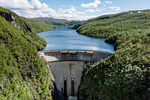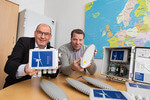News Release from Fraunhofer-Institut für Windenergiesysteme IWES
Wind Industry Profile of
How does climate change impact wind farm yields?
When planning a wind farm, yield assessments are vital when it comes to estimating the wind conditions at the planned site and calculating the expected energy yields while taking various factors into account. The basis of this is normally formed by historical wind data as well as measurement data that are extrapolated into the future during the planning process.
However, advancing climate change means that historical data might be less applicable for the future. Within the scope of the KliWiSt project, Fraunhofer IWES, together with the Climate Service Center Germany (GERICS), will be investigating the influence of climate change on wind energy site assessment in the coming decades. In addition, specific recommendations for action for the future determination of yield assessments for wind farms are also to be derived from this. The Federal Ministry for Economic Affairs and Energy (BMWi) is financing this research project to the tune of € 1.16 million through to 2024.
With the Paris Agreement, the United Nations set out climate goals in order to reduce greenhouse gas emissions so that any increase in the Earth’s temperature by the end of the century is restricted to well below two degrees compared to preindustrial levels. The development of wind energy usage in Europe and Germany is central to achieving these climate goals. The global average temperature has already increased by around 1°C, and it is set to rise even further. This also brings with it changes to large-scale wind conditions. Past analyses of climate projections have often focused on temperature and rainfall and less on wind potential. Furthermore, they refer mostly to the second half of the 21st century.
In the KliWiSt research project, the project partners will be analyzing climatic changes in connection with the wind over the coming 50 years as well as their potential consequences for wind farm yields. In particular, they will be looking at changes in yield-relevant parameters due to climate changes, as observed in the site assessment and when updating the quality of operational sites for existing and future wind energy projects. Naturally, the main focus will be on the wind potential itself.
In addition, other yield-relevant aspects, e.g., the impact on the flight conditions of bats and migratory birds as a result of climate change as well as the risk of icing, will also be compiled and analyzed. Climate projections indicate changes to meteorological parameters caused by advancing climate change around the world. “Renewable energies are highly sensitive to changes to these parameters as they depend first and foremost on the availability of wind, sun, and rainfall,” explained Dr. Thomas Remke from the Climate Service Center Germany (GERICS) – an independent scientific organizational unit of the Helmholtz-Zentrum Hereon.
New recommendations for taking climate uncertainties into account when planning wind farms will be derived from these results. Climate changes require that the existing basis for calculations be reassessed. “As part of the KliWiSt project, we aim to examine central questions for precise project planning of wind farms: What fluctuations in yield can be expected in the future as a result of climate change in Germany? Are these fluctuations already being taken into account precisely enough today in site assessments and how should the changes caused by climate change be best accommodated for in future yield assessments?” explained the project coordinator Dr. Martin Dörenkämper from the Fraunhofer Institute for Wind Energy Systems IWES. This project addressing the influence of climate change on wind will thus serve to optimize wind farm planning and allow the wind farms of tomorrow to be adapted to these conditions by taking the changes which can be foreseen today into consideration.
- Source:
- Fraunhofer IWES
- Author:
- Press Office
- Link:
- www.iwes.fraunhofer.de/...
- Keywords:
- Fraunhofer IWES, Germany, yield, climate change, turbine, wind farm, influence, sit assesment, funding, research, GERICS, UN, Paris Agreement

























